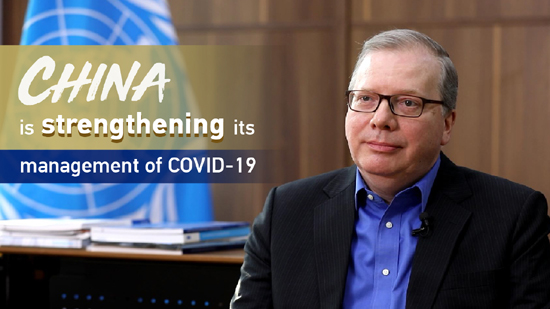|
|
|||||||
| |
||||||||
|
||
|
|
|||||||
| |
||||||||
|
||

CGTN: How do you evaluate the Chinese government's actions in dealing with the outbreak so far?
Rosellini: There's been a very vigorous set of actions taken by the government. And what the expert says is this has helped to reduce the peak and has blunted the peak in terms of the outbreak in Hubei, for example. And it means that the number of infections is likely to be significantly less than it would have been, otherwise. This is what I understand.
What has been important has been information sharing; information flows. And I think the government has really gone into overdrive in terms of providing information both domestically and to the international community.
What is also important is to learn the lessons from how this has been handled. And I think certainly at the local government level, there are very important lessons to be learned for the future in terms of more transparency and more information sharing.
But if we look at the reaction since the government, on December 31, announced the discovery of this new virus, we can see that the government has really been a whole-of-government approach that has put a lot of resources into combating the virus.
CGTN: Some criticize China for not being transparent enough amid the outbreak and claim it has challenged the Chinese government's credibility in dealing with public health emergencies. What's your take?
Rosellini: If we look at the start of the epidemic, I think we can see it's a very fast moving situation. Every day there's new data and new evidence coming out.
And I think for any government, it takes a little bit of time to respond. And we saw it at the initial stage. In terms of the local government's response I think that needs to be analyzed carefully in terms of how it should be handled in the future.
But I think what we've seen in January and now into February has been an enormous effort to collect the data and share the data. This is an enormous task. It's a task that is straining the health system in Wuhan. It's now spread to every province in China.
The health system has been strengthened and is managing. But I think we have to take into account that this outbreak is spreading, and the situation is changing every day. So I think if you take the context into account, the reaction and the availability of information within that context, it has been as good as can be expected.
CGTN: Any discussions within your office or in the UN at large about how to respond to the negative impact of this outbreak?
Rosellini: I think we're very concerned about the socio-economic impact. At the moment. we're at the early stages, and quite rightly, the emphasis has been on the health dimension of what is happening. But there's also an economic dimension. And for us, in the United Nations also the social and human development side of it is very important.
We are interested to make sure that, for example, this emergency doesn't distract attention from the goal this year of eliminating extreme poverty. And we know that the impact of such a health emergency can affect different groups differently.
Poorer communities without capacity or resources may be more affected. There's an impact on the health system for people not necessarily suffering from coronavirus, but from other illnesses which may not be prioritized because of the attention on coronavirus. There's an impact on the education system with children not being able to go to school for several weeks. And then there's a broader economic impact as well.
So we are seeing how we can assist in terms of looking at assessing some of the socio-economic impact, particularly on vulnerable groups and poorer communities. And we hope that, as the medical side of it, the health side becomes more stable or is clearer from the data - what's gonna be happening in the medium term. Then there can be more focus on the development impact of what is happening.
News Source: CGTN
| ||||
| © China Radio International.CRI. All Rights Reserved. 16A Shijingshan Road, Beijing, China. 100040 |